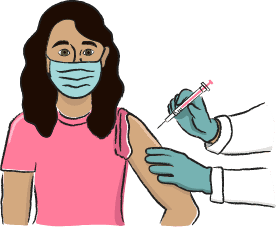Vaccination is the most effective way to keep yourself, your family and your community safe from COVID-19. We've outlined some key information from the CDC and public health sources.

Vaccination is the most effective way to keep yourself, your family and your community safe from COVID-19. We've outlined some key information from the CDC and public health sources.

Three vaccines have been approved by the FDA under the emergency use authorization: Pfizer-BioNTech, Moderna , and Johnson & Johnson/Janssen's COVID-19 Vaccine. Vaccine locations and priority designations vary by state. Check the CDC's Vaccine Finder for locations or your State Health Department to find out where you can get vaccinated.
Before applying for approval, scientists gave the vaccines to thousands of people, which was more people than in a typical vaccine trial. These trials involved adults from a diverse and inclusive range of races, ethnicities and ages, including people from communities of color. The FDA identified no serious health concerns with any of the approved COVID-19 vaccines.
Clinical trials showed the Moderna vaccine to be 94 percent effective and the Pfizer vaccine to be 95 percent effective at preventing laboratory-confirmed COVID-19 illness in people with no previous COVID-19 infection who had received both does. The vaccine was effective in different age groups, including those over 65 years old and different racial and ethnic groups. The J&J vaccine was shown to be 85% effective in preventing severe illness. It is recommended to get whichever is first made available to you.
Results from the clinical trials showed that vaccine recipients experienced side effects such as: a sore arm, fatigue, headache, fever or muscle pain. The side effects typically appeared within two days of getting the vaccine and lasted about a day. Symptoms were more common after the second dose than the first dose with the Moderna and Pfizer versions. Side effects are a sign of an immune response.
Disclaimer: YKK AP is not an expert in medicine or public health - we just want to be good neighbors.
Yes. There is very limited information about how much natural immunity a person may have after recovering from COVID-19. Both this disease and the vaccines are new. We don’t know how long protection lasts for those who get infected or those who are vaccinated. It is recommended that people who have had COVID-19 and recovered get vaccinated.
No. Vaccination should wait until you are symptom free and are able to discontinue isolation.
No. You can still get a COVID-19 test after recently getting vaccinated. The vaccine will not affect the results of a SARS-CoV-2 nucleic acid amplification or antigen test.
No. The federal government will cover the cost of the vaccine. Health care providers may charge an administration fee, but most health insurance will cover these fees. Providers must give the vaccine regardless of the patient’s ability to pay.